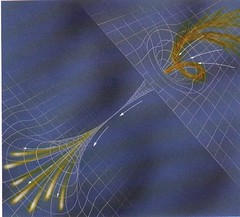Realistically, says Kaku, the only possible way to avoid the death of the universe is to leave. "Perhaps civilisations billions of years ahead of ours will harness enough energy to punch a hole in space and escape, in a hyper-dimensional space ark, to a new universe," he speculates.
This is not as far fetched as it may seem. As Kaku points out, Einstein's equations allow for the possibility of "Einstein-Rosen bridges" connecting two parallel universes. In order to deal with the intense energy requirements of such a project, says Kaku, "an advanced civilisation might create huge banks of laser beams and atom smashers to create the unbelievably intense temperatures, energy and densities necessary to open up holes in space and leave the universe."
Kaku continues:
Calculations show that these gigantic machines must be the size of star systems, but this might be possible for civilisations billions of years ahead of ours. Unfortunately, some preliminary calculations show that the wormhole might only be microscopic in size. If so, an advanced civilisation might resort to shooting molecular-sized robots, called "nanobots", through the wormhole."As incredible as these scenarios are, argues Kaku, "they are consistent with the known laws of physics and biology."
Once on the other side, these nanobots would then create huge DNA factories to grow clones and replicas of their creators. Since they would contain the entire database of their civilisation, they would use this to resurrect it in another universe.
Although the physical bodies of these individuals will die when the universe freezes over, their genetic twins will live on, so that their civilisation, like a Phoenix, may flourish again.


No comments:
Post a Comment